Arihanta Institute faculty offer Graduate Seminars at Claremont School of Theology and Self-Paced Course Series designed for students in theology, religious studies, South Asian studies, and related graduate programs. These flexible, academically rigorous offerings support deep engagement with nonviolence, ethics, and engaged Jain studies.
Graduate Seminars & Course Series
Back To Universities
Undergraduate Students
UPCOMING SEMINARS
Graduate Course
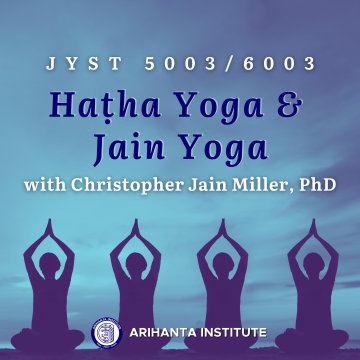
Haṭha Yoga & Jain Yoga
Added to cart
Haṭha Yoga & Jain Yoga
The “Haṭha Yoga and Jain Yoga” course carefully considers the development of the haṭha yoga tradition, the medieval forms of yoga that emerged after India’s classical period, and which are the predecessors of today’s forms of physical yoga. Students are offered the opportunity to undertake the postural, breathing, and meditation techniques found in medieval haṭha yoga texts as well as to see how these texts influenced, or were perhaps influenced by, the Jain yoga tradition in particular. Upon successful completion of this class, students will be able to:Understand the historical development and context of haṭha yoga traditions, including their medieval and modern Jain forms.Analyze intertextual engagements between haṭha yoga texts and Jain yoga texts.Engage in primary postural, breathing, and meditation techniques from medieval haṭha yoga texts.Undertake and present their research in the field of Yoga Studies and Engaged Jain Studies with a particular focus on haṭha yoga traditions.
 Spring 2026 (January 26 – May 4, 2026)
Spring 2026 (January 26 – May 4, 2026)Thursday 8:00 - 10:50 a.m. PT
Instructor
Graduate Course
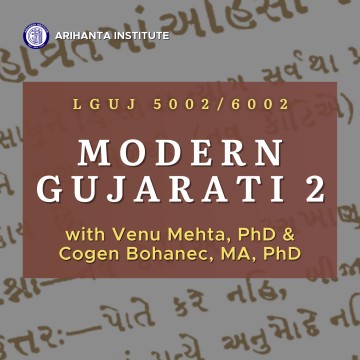
Modern Gujarati 2
Added to cart
Modern Gujarati 2
This course will continue our immersive journey into the vibrant world of Gujarati language and literature with this second-semester course in the two-semester sequence (Modern Gujarati 1 & 2). This course builds upon the foundation laid in the first semester, focusing on advancing your Gujarati language skills as a research tool for translating the vast and diverse tapestry of Gujarati literature. Through a structured approach based on the Pedagogical Ladder framework (incremental skill development), we will delve deeper into the intricacies of modern Gujarati grammar, vocabulary, and language structure. This advanced knowledge will enable students to further develop research skills for translating modern Gujarati texts and prepare for future studies in spoken Gujarati and pre-modern Gujarati texts. This second semester course offers an in-depth exploration of Gujarati language structures and grammatical features, focusing on advanced pronouns, negation forms, adjectives, adverbs, participles, gerunds, and complex verbs. The curriculum is designed to enhance linguistic proficiency by examining passive voice, causatives, relative and correlative constructions, and expressions of necessity. Students will also delve into special grammatical cases and conversational techniques, with an emphasis on cultural contexts and idiomatic expressions. The semester concludes with a comprehensive review and assessment, ensuring students are well-equipped with advanced conversational skills and a deep understanding of Gujarati language nuances. In addition to enhancing language skills, our course will continue to cover various cultural, religious, and philosophical aspects of Gujarati culture, history, and traditions. We will further explore the rich cultural history of Gujarati literature, examining its progression from its origins in 12th-century religious and epic poetry to its modern forms. We will study the language's adaptation through influences from Jain scholars, the Bhakti movement, and Western education. By the end of this course, students will have acquired:Comprehensive understanding of advanced Gujarati grammar.Strategies for mastering skills required to translate Gujarati sources with greater accuracy.Enhanced familiarity with the Pedagogical Ladder framework and its application to advanced language acquisition.Deeper insight into the cultural and historical context of Gujarati literature. This course is ideal for:Students of South Asian traditions and dharma religions (Jain, Hindu, and Buddhist).Researchers interested in advanced studies of Gujarati language and literature.Students of South Asian language and linguistics.Anyone passionate about the rich cultural heritage of Gujarat.
 Spring 2026 (January 26 – May 4, 2026)
Spring 2026 (January 26 – May 4, 2026)Monday 11:00 a.m. – 12:25 p.m. / Friday 11 a.m. – 12:25 p.m. PT
Instructors
Graduate Course
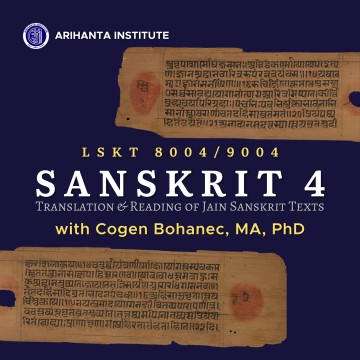
Sanskrit 4: Translation and Reading of Jain Sanskrit Texts
This advanced Sanskrit course is a direct continuation of Sanskrit 3 and forms part of Arihanta Institute’s ongoing faculty–student research project on Hemacandra’s Yoga-śāstra and its Svopajña-vivaraṇa commentary. Designed for students who have completed a foundational first-year Sanskrit sequence and can read intermediate prose and verse texts, the course applies grammatical and interpretive knowledge to the translation and analysis of this seminal Jain treatise. Through the close reading of Yoga-śāstra passages and their commentarial explanations, students deepen their understanding of Sanskrit syntax, Jain philosophical vocabulary, and classical scholastic style while situating the text within broader South Asian intellectual traditions. In addition to its focus on Jain philosophy and hermeneutics, the course provides a linguistic foundation for understanding the evolution of Indo-Aryan languages. Mastery of Sanskrit at this level equips students for further study of the Middle Indo-Aryan Prakrits, Apabhraṃśas, and later vernaculars—languages that are central to the study of Jain and wider South Asian literary traditions. Emphasis is placed on developing publication-quality translation and research skills, integrating philological precision, hermeneutic awareness, and critical engagement with primary and secondary sources. By participating in a collaborative academic environment—where faculty and students contribute to an evolving body of Jain Studies scholarship—students refine their ability to produce rigorous, well-annotated translations suitable for conference presentation or publication. The course culminates in an independent research paper demonstrating mastery of Sanskrit language and commentarial analysis within the context of Hemacandra’s thought and Jain philosophy more broadly. Learning ObjectivesDevelop advanced Sanskrit reading, translation, and philological skills, demonstrating mastery of complex grammar, syntax, and vocabulary through accurate and idiomatic renderings of primary texts.Analyze and interpret Sanskrit commentarial literature with attention to Jain philosophical frameworks—particularly Hemacandra’s Yoga-śāstra and Svopajña-vivaraṇa—while engaging in comparative hermeneutic dialogue with Hindu and Buddhist traditions.Apply linguistic and hermeneutic methods to assess philosophical arguments, religious language, and the structure of commentarial reasoning in premodern South Asian texts.Situate Jain philosophical texts within broader South Asian and global intellectual traditions, including comparative study of dharmic and Abrahamic perspectives on ethics, epistemology, and contemplative practice.Discuss and critique nuances in South Asian philosophy, theology, linguistics, literature, and culture, demonstrating both technical precision and interpretive depth.Produce publication-quality translation and research projects, integrating philological analysis, hermeneutic reflection, and ethical awareness appropriate to graduate-level scholarship.
 Spring 2026 (January 26 – May 4, 2026)
Spring 2026 (January 26 – May 4, 2026)Tuesday 8:00 - 9:30 a.m. PT and Friday 8:00 - 9:30 a.m. PT
Instructor
Graduate Course

Veganism, Climate Change, and Environmental Justice
This interdisciplinary course explores the intersections between veganism, climate change, and environmental justice. It considers veganism not merely as a dietary or lifestyle choice, but as a political and ecological practice. Through philosophical, scientific, and activist perspectives, students will interrogate the environmental impacts of animal agriculture, the racialized and classed dimensions of climate vulnerability, and the transformative potential of food systems rooted in justice and care. Learning ObjectivesGain a basic understanding of the origin, history, and applications of veganism both regionally and globally.Understand the main features of the global climate crisis and their relationship to industrial food systems.Connect climate crisis to differential climate vulnerability, or how environmental consequences impact populations differently due to race and class-based discrimination.Understand the basis tenets of environmental justice, with respect to animal-based industries in particular.Deploy tools for constructive dialogue across cultures and religions regarding veganism, climate change, and environmental justice.
 Spring 2026 (January 26 – May 4, 2026)
Spring 2026 (January 26 – May 4, 2026)Thursday 8:00 - 10:50 a.m. PT
Instructor
GRADUATE SEMINARS
Graduate Seminars are synchronous courses taught by leading scholars in their fields. They take place at our accredited collaborating university, Claremont School of Theology and offer interactive discussions, faculty mentorship, and research-based assignments.
- Structured as 3-credit, semester-long courses.
- Eligible for credit transfer at most universities (typically up to two external courses).
- Graded and accredited through Claremont School of Theology.
- Enrollment, tuition, and financial aid are directly through CST.
- Exceptional undergraduates may participate with faculty approval.
Graduate Course
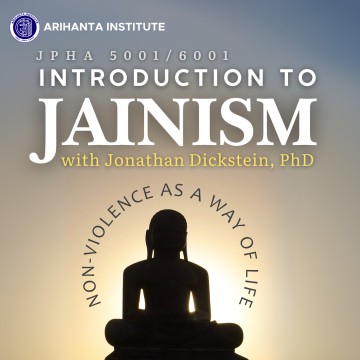
Introduction to Jainism: Non-violence as a Way of Life
This course provides an introduction to Jainism in India with a focus on the three “B”s—Belief, Behavior, Belonging. The course surveys the emergence of Jainism in ancient India, the life and teachings of Lord Mahavira, the ascetic and lay aspects of Jain society, Jain philosophy and ethics, and religious practices such as vegetarianism, fasting, and worship. The course lends particular emphasis to the ethic of ahiṃsā (non-violence) and its implications for contemporary Jain animal ethics and environmentalism. Upon successful completion of this class, students will be able to:Chart the historical development of Jainism in India.Identify the major features of Jain philosophy.Connect Jain philosophy to Jain practice, both ritual and ethical practice (“Applied Jainism”).Describe Jainism as a lived religion with its contemporary lived communities and aspects.Describe ethical contestations within Jain communities as they engage current issues such as feminist critique, consumer capitalism, industrial agriculture, climate collapse, and social justice writ large.
 Fall 2025 (September 2 – December 8, 2025)
Fall 2025 (September 2 – December 8, 2025)Wednesday 8:00 - 10:50 a.m. PT
Instructor
Graduate Course
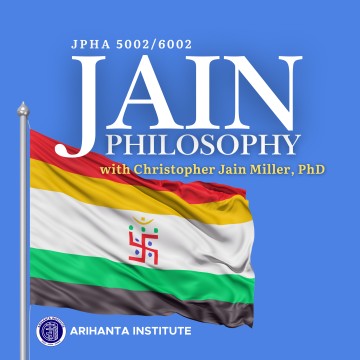
Jain Philosophy
Added to cart
Jain Philosophy
This course is a study of Jain philosophy grounded in the practical and moral imperatives of non-violence and compassion. Students will learn how non-violence and compassion emerge from the intricate system of Jain ontology, metaphysics, cosmography, epistemology, ethics, and soteriology. Historical context for the development of Jain philosophy in relation to other South Asian philosophical systems is included, while students will also integrate their learning into their personal, social, and/or professional lives today. samyag-darśana-jñāna-caritrā-mokṣa-mārgaḥ“Correct worldview, correct knowledge, and correct conductcomprise the path to liberation.”– Tattvārtha-Sūtra 1.1 Upon successful completion of this class, students will be able to:Articulate Jain ontology, metaphysics, cosmology, epistemology, ethics, and soteriology.Understand the historical development of Jain philosophy in relation to other South Asian philosophical systems.Demonstrate integration of Jain philosophy into their personal, social, and/or professional lives.
Instructor
Graduate Course
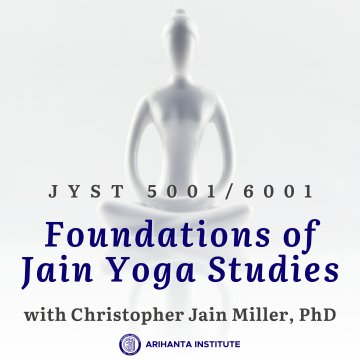
Foundations of Jain Yoga Studies
Added to cart
Foundations of Jain Yoga Studies
Foundations of Jain Yoga Studies provides students with the historical and philosophical foundations for engaging in the study of Jain yoga. Students will learn about the history of yoga broadly, while also learning core methodologies used to study yoga in the field of Yoga Studies. With this new knowledge and skillset, students will learn how to study Jain yoga and see how it emerged in engagement with other yoga traditions since ancient times and into the present. Upon successful completion of this class, students will be able to:Understand the foundational history and philosophies of yoga.Perform research using core methodologies used in the field of Yoga Studies.See how Jain Yoga emerged in engagement with other traditions using an Engaged Jain Studies methodology.Present their research on Jain Yoga.
Instructor
Graduate Course
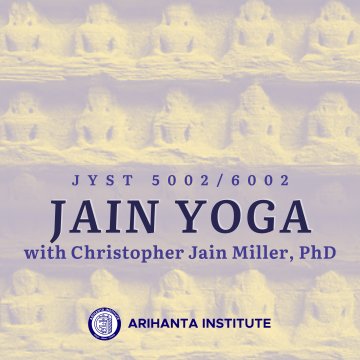
Jain Yoga
Added to cart
Jain Yoga
Jain Yoga considers Jain yoga from ancient sources to the present. We will study secondary scholarship analyzing Jain yoga from critical perspectives, while reading translations from Sanskrit and Prakrit primary sources describing Jain yoga. Students will also practice and reflect on their experience of various forms of Jain yoga and meditation, experimenting with what it means to embody Jain yoga principles and techniques in their everyday lives in contemporary society. No prior experience is necessary. Upon successful completion of this class, students will be able to:Understand the historical development of Jain Yoga in relationship to the broader historical and religio-philosophical milieus with which Jain authors were engaging.Identify key thinkers in Jain Yoga and understand the particulars of their unique Jain yoga systems.Demonstrate their ability to perform and present basic research and writing in relation to the field of Jain Yoga, Yoga Studies, and Jain Studies.Practice fundamental Jain yoga and meditation techniques and understand how these practices are relevant for their own lives in contemporary society. Student Reviews"Fantastic course to learn about Jain Yoga and its development." — Graduate Student, Claremont School of Theology, 2024 “Dr. Miller's way of teaching is a wonderful way to learn, allowing the information to be relevant to each of the students in their course of study.”— Graduate Student, Claremont School of Theology, 2024 "Excellent teaching, fantastic yoga demonstration videos, and group readings."— Graduate Student, Claremont School of Theology, 2024 "It was very interactive and well-done. I believe that it was very effective the way that it was organized."— Graduate Student, Claremont School of Theology, 2024 "All of the sūtra readings from the rare and no longer published books were most helpful."— Graduate Student, Claremont School of Theology, 2024 “Highlights of the course were the knowledge of the teacher and the students. It was a very powerful learning experience.”— Graduate Student, Claremont School of Theology, 2024 “Dr. Miller is doing excellent work!”— Graduate Student, Claremont School of Theology, 2024
 Fall 2026
Fall 2026 Thursday 8:00 - 10:50 a.m. PT
Instructor
Graduate Course
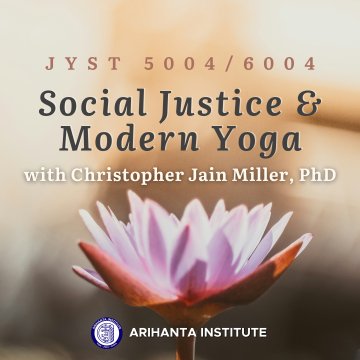
Social Justice and Modern Yoga
Added to cart
Social Justice and Modern Yoga
Social Justice and Modern Yoga surveys the history and contemporary practice of modern yoga and its intersection with issues of social justice. Students will encounter both the major names and lineages in the history of transnational modern yoga as well as some of the lesser-known figures who have contributed to the development of transnational yoga into the present. The course is structured both historically and thematically, presenting topics including, but not limited to, yoga’s intersections with warrior asceticism, colonization, non-violent social justice movements, nationalism, Orientalism, the carceral system, racism, White supremacy, appropriation, gender, foodways, speciesism, pollution, necropolitics, biopolitics, neoliberal capitalism, and abuse. Students will be trained in the basic methods of writing yoga ethnography and social history and will complete an ethnographic research project on a topic of their choice related to the academic field of Modern Yoga Studies. Upon successful completion of this class, students will be able to:Understand central historical developments of transnational modern yoga.Understand how particular forms of modern yoga are entangled with particular issues of social justice.Perform and present the results of basic ethnographic fieldwork or social historical research pertaining to a contemporary yoga community with particular attention to an issue of social justice.Gain a working knowledge of some of the major issues and questions in the field of Modern Yoga Studies. Student Reviews"Learning from Dr. Miller was an incredible gift. His wisdom and knowledge of these topics are so helpful." — Graduate Student, Claremont School of Theology, 2024 “Dr. Miller is a tremendous resource of information. His style of teaching is helpful, conversational, and inclusive. I appreciate how he asked the class questions and got us thinking in new ways. I would highly recommend this course.” — Graduate Student, Claremont School of Theology, 2024 "The prerecorded lectures that Professor Miller shared before each class were very helpful. For a working professional like me this was a big relief!” — Graduate Student, Claremont School of Theology, 2024 “Dr. Miller's passion for the topics came through in all classes and lectures.” — Graduate Student, Claremont School of Theology, 2024 “It was great to have students from other institutes to learn with. Continuing this is important for global perspectives.” — Graduate Student, Claremont School of Theology, 2024 “Dr. Miller is a tremendous resource of information. His style of teaching is helpful, conversational, and inclusive. I appreciate how he asked the class questions and got us thinking in new ways. I would highly recommend this course.” — Graduate Student, Claremont School of Theology, 2024
 Fall 2025 (September 2 – December 8, 2025)
Fall 2025 (September 2 – December 8, 2025)Thursday 8:00 - 10:50 a.m. PT
Instructor
Graduate Course
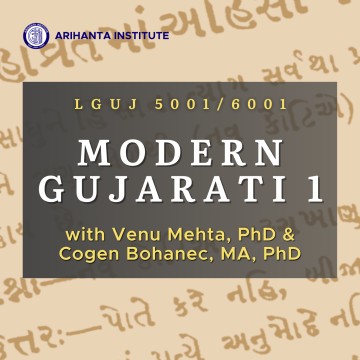
Modern Gujarati 1
Added to cart
Modern Gujarati 1
Embark on an immersive journey into the vibrant world of Gujarati language and literature. This first-semester course, part of a two-semester sequence (Modern Gujarati 1 & 2), focuses on developing Gujarati language skills as a research tool for translating the vast and diverse tapestry of Gujarati literature. Through a structured approach based on the Pedagogical Ladder framework (incremental skill development), we will explore the fundamentals of modern Gujarati grammar, vocabulary, and language structure. This foundational knowledge will enable students to develop research skills for translating modern Gujarati texts and lay the groundwork for future studies in spoken Gujarati and pre-modern Gujarati texts. This class, over the course of two semesters, aims to provide a comprehensive understanding of the Gujarati language, focusing on both script and grammar. Students will delve into the Gujarati script, learning proper reading and writing techniques. The curriculum will cover essential grammatical concepts such as pronouns, cases, and nominal inflections, with an emphasis on understanding grammatical gender and plural forms. Students will also be introduced to various verbal tenses, along with negation and politeness in communication and other idiomatic forms. The course will build on these foundational topics by exploring increasingly complex grammatical structures and syntaxes. In addition to learning language skills, our course will informally cover various cultural, religious, and philosophical points regarding Gujrati culture, history, and traditions. We will discuss the rich cultural history of Gujarati literature, spanning from its origins in 12th-century religious and epic poetry to its modern forms. We will study the language's adaptation through influences from Jain scholars, the Bhakti movement, and Western education. By the end of this course, students will have acquired: Comprehensive understanding of half of the necessary Gujarati grammar.Strategies for fostering deeper understanding and mastery of skills required to translate Gujarati sources.Familiarity with the Pedagogical Ladder framework and its application to language acquisition. Insight into the cultural and historical context of Gujarati literature. This course is ideal for: Students of South Asian traditions and dharma religions (Jain, Hindu, and Buddhist).Researchers interested in Gujarati language and literature.Students of South Asian language and linguistics.Anyone fascinated by the rich cultural heritage of Gujarat.
 Fall 2025 (September 2 – December 8, 2025)
Fall 2025 (September 2 – December 8, 2025)Monday 11:00 a.m. - 12:25 p.m. / Friday 11:00 a.m. - 12:25 p.m. PT
Instructors
Graduate Course
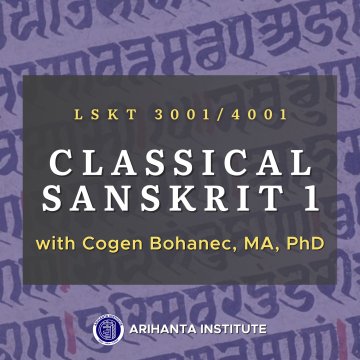
Sanskrit 1
Added to cart
Sanskrit 1
Sanskrit 1 will complete the first half of the Devavāṇīpraveśikā Sanskrit primer (Goldman and Goldman, 1980). In the process, students will learn to memorize, recognize, and recall all major paradigms of inflection (conjugations, declensions, indeclinable suffixes, prefixes, etc.). Students will gain the important research skills of basic philology such as etymology and syntactical analyses while translating modified excerpts from Sanskrit literature. Students will also memorize important Sanskrit verses designed to enhance basic vocabulary and impart familiarity with the cultural, philosophical, and linguistic landscape of Sanskrit literature. Learning Objectives Learn to read Sanskrit in Devanagari font. Acquire basic Sanskrit vocabulary. Learn to identify and understand the basic grammatical forms covered in class.Learn to understand key differences between Sanskrit and English syntaxes and to be able to convert Sanskrit syntax into English syntax.Learn basic skills for translation of Sanskrit primary sources for research Become familiarized with other cultural and intellectual elements of the broader Sanskrit tradition. Student Reviews“I just completed a year of Sanskrit under Dr. Bohanec, who has devised an accessible approach to the language even the densest aspiring linguist (me) can utilize. He also, almost reflexively, situates the language in its broader dharmic settings, giving students a historical, cultural, and theological education in addition to the Sanskrit itself. Finally, he's just a righteous dude. I highly, highly recommend this [course].”— Reese L., Graduate Student, Claremont School of Theology, 2024 “Prof. Bohanec is an immense mind and I feel privileged to have had a course with him...[his] encouragement, kindness, sense of humor, and vast body of knowledge in South Asian studies, ethics, and exegesis are incredible. I also appreciated how encouraging he was at every stage...This is the most difficult course I've taken and Prof. Bohanec is to be commended for "data compressing" such difficult material, and providing such a positive and constructive environment.— Graduate Student, Claremont School of Theology, 2024 There were so many helpful things about this course! In-class translation work with other students was wonderful. The best advice given by the instructor was to do what it took to enjoy the material itself. This “enjoyment” emphasis was often in direct conflict with class expectations (see next answer), but over the break I continue to study and emphasize finding enjoyment in those studies. This has ended up changing my entire outlook on the MA program in general, and Prof. Bohanec cannot be over-thanked for this suggestion; simple as it is, it has been very impactful.”— Graduate Student, Claremont School of Theology, 2024
 Fall 2025 (September 2 – December 8, 2025)
Fall 2025 (September 2 – December 8, 2025)Monday 8:00 - 9:25 a.m. / Friday 8:00 - 9:25 a.m. PT
Instructor
Graduate Course
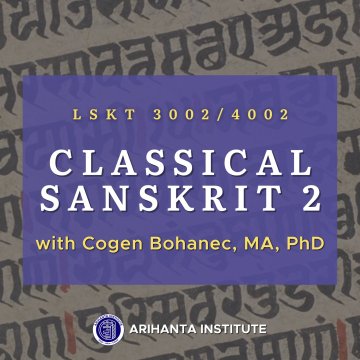
Sanskrit 2
Added to cart
Sanskrit 2
Sanskrit 2 will complete the second half of the Devavāṇīpraveśikā Sanskrit primer (Goldman and Goldman, 1980). In the process, students will learn to memorize, recognize, and recall all major paradigms of inflection (conjugations, declensions, indeclinable suffixes, prefixes, etc.). Students will gain the important research skills of basic philology such as etymology and syntactical analyses while translating modified excerpts from Sanskrit literature. Students will also memorize important Sanskrit verses designed to enhance basic vocabulary and impart familiarity with the cultural, philosophical, and linguistic landscape of Sanskrit literature. Learning ObjectivesLearn to read Sanskrit in Devanagari font. Acquire basic Sanskrit vocabulary. Learn to identify and understand the basic grammatical forms covered in class.Learn to understand key differences between Sanskrit and English syntaxes and to be able to convert Sanskrit syntax into English syntax.Learn basic skills for translation of Sanskrit primary sources for research Become familiarized with other cultural and intellectual elements of the broader Sanskrit tradition. Student Reviews"Dr. Bohanec is the rare breed of careful and diligent teacher who is also a determined and capable learning coach. One is Immediately caught up in his enthusiasm for the subject and his capacity to communicate it in ways that share that love. Indeed, as an instructor, this enables him also to be kind and generous in his teaching." — Jay T.H., United States, 2024
 Spring 2026 (January 26 – May 4, 2026)
Spring 2026 (January 26 – May 4, 2026)Monday 8:00 – 9:25 a.m. / Friday 8:00 – 9:25 a.m. PT
Instructor
Graduate Course
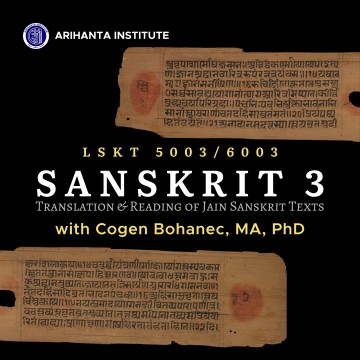
Sanskrit 3: Translation & Reading of Jain Sanskrit Texts
This course is designed for students who have completed an introductory first-year course in Sanskrit and who are familiarized with the content of the Devavāṇīpraveśikā or an equivalent primer. Students will engage in the reading and translation of an important source from the Jain canon, along with its commentary. This course aims to deepen students' understanding of Sanskrit language and literature, as well as introduce them to the commentarial style and tradition. We may select specific texts that are relevant to students’ research and thus help students with their research in terms of translating primary sources. Learning Objectives Develop advanced Sanskrit reading and translation skills.Analyze and interpret complex Sanskrit texts.Understand the commentarial style and tradition in Sanskrit literature with a particular focus on the Jain tradition, but also in conversation with Hindu and Buddhist traditions.Apply knowledge of Sanskrit grammar and syntax to translation.Discuss nuances of South Asian philosophy, theology, languages, literature, culture, etc.Assist and advise students regarding their research in terms of employment of translations of primary source texts.
 Fall 2025 (September 2 – December 8, 2025)
Fall 2025 (September 2 – December 8, 2025)Tuesday 8:00 - 9:25 a.m. / Friday 9:30 - 10:55 a.m. PT
Instructor
Graduate Course
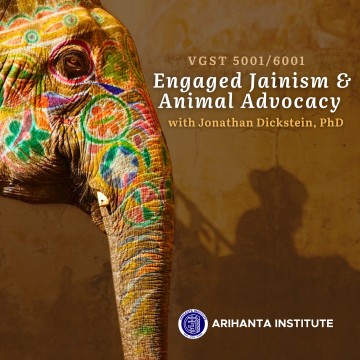
Engaged Jainism & Animal Advocacy
Added to cart
Engaged Jainism & Animal Advocacy
How do the core Jain values of ahiṃsā (nonharming), aparigraha (nonpossessiveness), and anekāntavāda (non-one-sidedness) relate to the ethics and practices of animal protection and advocacy? Jains have insisted on the practice of vegetarianism for millennia, but what else might a proactive “Engaged Jainism”' involve? Is vegetarianism sufficient on the dietary level? Is veganism sufficient? Why or why not? Part One of the course explores sites of institutionalized and corporate hiṃsā (harm) towards animals, focusing specifically on industrialized animal agriculture. The purpose of this—at times vivid—investigation is to begin to comprehend just how harmful these anthropogenic phenomena are for both the animals and humans contained therein. Part Two pivots to how Jainism—past, present, and future—interfaces with these phenomena. The focus will be on the Jain ethic of nonharming, how it determines dietary practices, but also specifically how it might motivate an “Engaged Jainism” that extends well beyond what one does and doesn’t eat. Part Three looks into past and contemporary animal advocacy movements and social justice activism more broadly understood. This part will look at the diversity of principles, targets, and tactics employed by these various movements. Specifically we will explore how these movements invoke nonviolence as the guiding force behind their educational, legal, political, entrepreneurial, and grassroots activist efforts to address the plights of animals. Upon successful completion of this class, students will be able to:Broadly chart the main features of contemporary industrial animal systems.Identify mainstream perspectives on animal use and consumption.Connect Jain and Non-Jain philosophy to practice (“applied ethics” and “Engaged Jainism”).Understand common forms of animal advocacy and activism and the debates surrounding them.Describe ethical contestations within Jain communities as they engage the questions of how advocacy and activism relate to ahiṃsā, noninterventionist. interpretations of karma theory, the validity of alternative views (nayas), and the lived lay realities of cultural “integration.” Student Reviews“Everything is really excellent.”— Graduate Student, Claremont School of Theology, 2024 “Excellent course and engagement by professor.” — Graduate Student, Claremont School of Theology, 2024
 Fall 2026
Fall 2026 Wednesday 8:00 - 11:50 a.m. PT
Instructor
Graduate Course
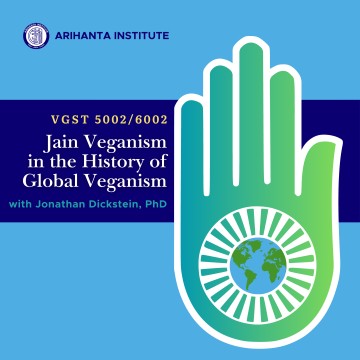
Jain Veganism in the History of Global Veganism
Added to cart
Jain Veganism in the History of Global Veganism
This course provides a historical overview of plant- (and non-plant-) based living from a regional perspective. Tracing the emergence and development of plant-dominant, vegetarian, and vegan diets in Asia, Africa, Europe, and the Americas, the course foregrounds the cultural, religious, and geographic factors behind these—as well all adjacent and alternative—consumption patterns. Pivoting from the regional to the global, the course then explores the emergence of transnational veganism and how Jain veganism fits in this modern phenomenon. Upon successful completion of this class, students will be able to:Locate significant features of international food patterns.Identify cultural and historical food trends and their relationships to economics and politics.Connect Jain and Non-Jain philosophies to food practices (“Engaged Religion”).Understand relationships between religion, the body, and consumption.Describe the intricacies of the Jain diet, past and present. Student Reviews“I appreciated the breadth and depth of the topic! More than any material I've yet consumed or classes I've taken, this course changed my ideas on what "vegan" means - for the better. I gained more cultural literacy and conversational competencies, which then created a direct positive effect on my daily and activist life. This course is truly fantastic and I appreciated it a great deal.”— Graduate Student, Claremont School of Theology, 2024 “All the materials and assignments were interesting, I looked forward to this course a great deal every single week. I appreciated the global and historical perspective and I think this course would be a fantastic introduction for anyone interested in animal studies, veganism, animal rights, and/or cultural foodways. ” — Graduate Student, Claremont School of Theology, 2024
Instructor
Graduate Course

Food Politics in South Asia & Beyond
Added to cart
Food Politics in South Asia & Beyond
This course delves into the intricate dynamics of food practices, systems, and politics in South Asia, with a particular emphasis on India's diverse religious, regional, class, and caste groups. It aims to foster a nuanced understanding that food is never merely sustenance but serves as a potent vehicle for constructing and expressing individual, familial, regional, and even national identities, with profound social and often discriminatory consequences. The course begins with an exploration of religious perspectives on food production, preparation, consumption, and commensality, focusing on dietary prescriptions and proscriptions in Jainism, Hinduism, Buddhism, and Islam. From there, the content transitions to contemporary issues, events, laws, and policies that illustrate how food is weaponized in projects of social demarcation and oppression. Key topics include the rise of vegetarian Hindu nationalism, the pure/impure dichotomy, gender and "women's work," colonial influence on production and consumption, the contemporary Westernization of South Asian foodways, “peasant” resistance movements, and the differentially-impactful ecological ramifications of increasingly industrialized food systems. The course culminates with a brief discussion of specific gastropolitical debates in Central, East, and Southeast Asia, as well as in the South Asian diaspora in North America, providing a comparative and transnational perspective. Upon successful completion of this class, students will be able to:Describe (with examples) how integral food is to identity formation.Locate significant features of regional food politics.Identify the intersections of religion, gender, race, class, and caste in conflicts around food production and consumption.Compare and contrast Jain, Hindu, Buddhist, Sikh, Muslim, and Christian foodways.Discuss the impacts of colonialism, Westernization, and industrialization on South Asian food systems.
Instructor
SELF-PACED COURSE SERIES
Self-Paced Course Series are curated collections of shorter courses designed to supplement formal graduate coursework and support independent study.
- Primarily asynchronous and flexible in structure.
- No grades issued, but students may request a certificate upon successful completion.
- Faculty may incorporate these into their syllabi or assign additional assessments for credit consideration.
- Some universities may award credit for certain courses (e.g. Graduate Sanskrit) or when paired with additional evaluation.
- We offer flexible pricing for Self-Paced Course Series to ensure affordability. Contact us at learn@arihantainstitute.org for more information.
Jain Philosophy (90hrs)
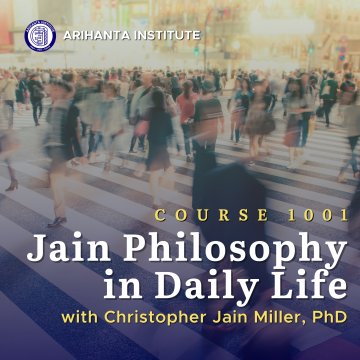
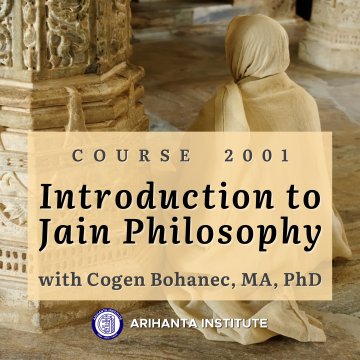
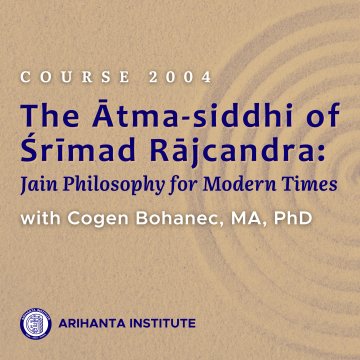
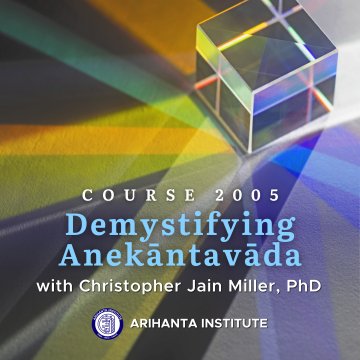
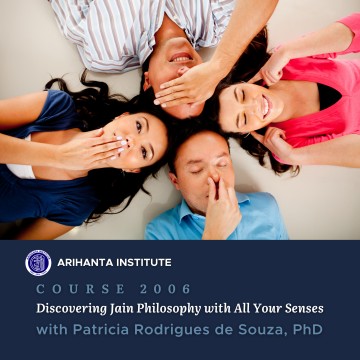
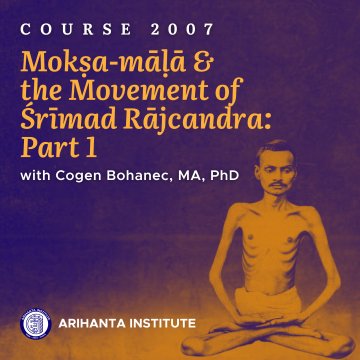
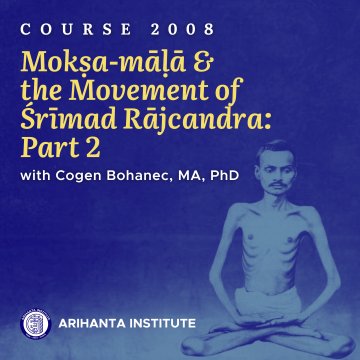
Engaged Jainism (98hrs)

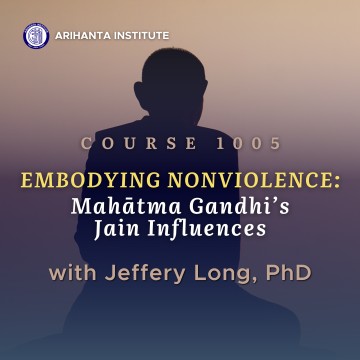
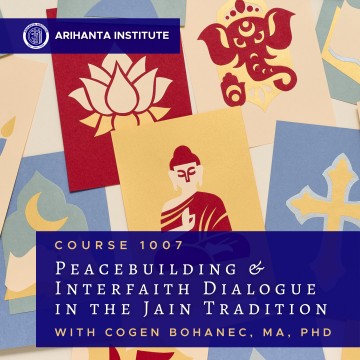

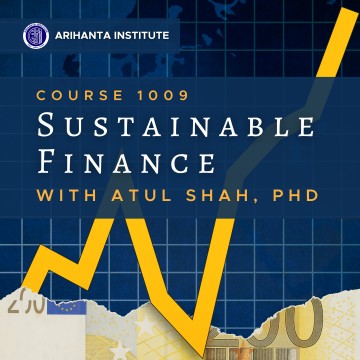
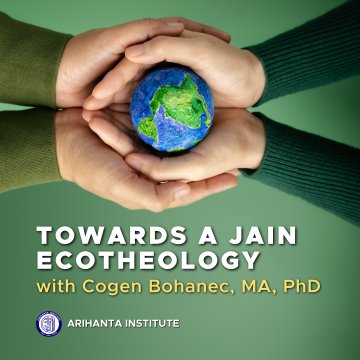
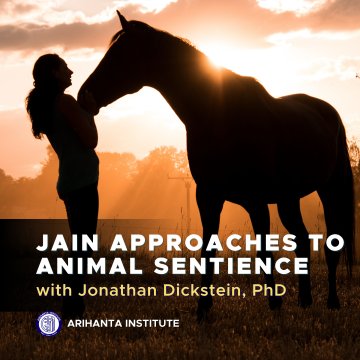

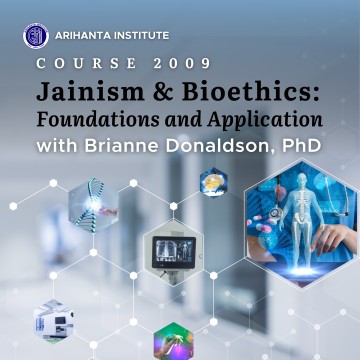
Animal Advocacy & Vegan Studies (44hrs)
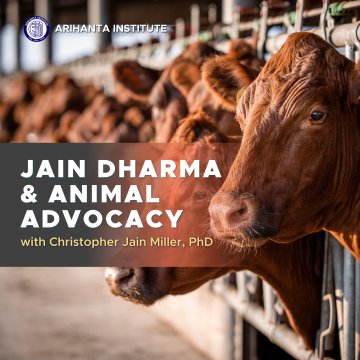



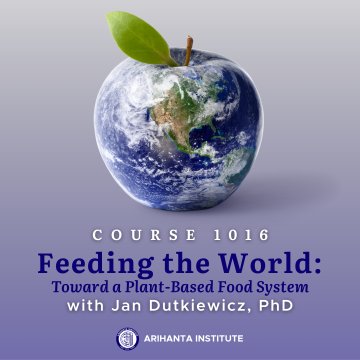
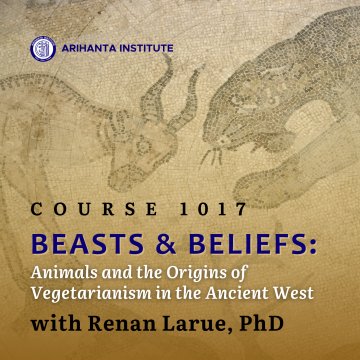
Yoga Studies (126hrs)

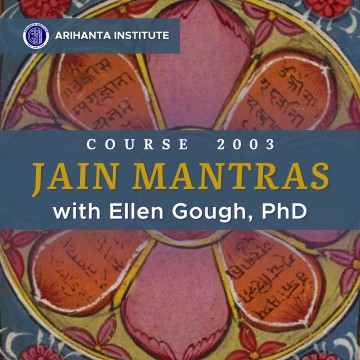
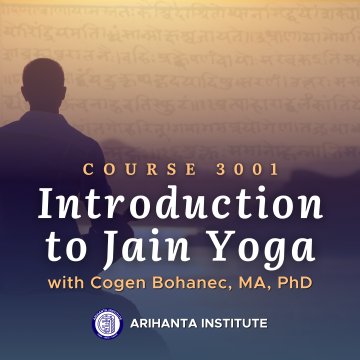
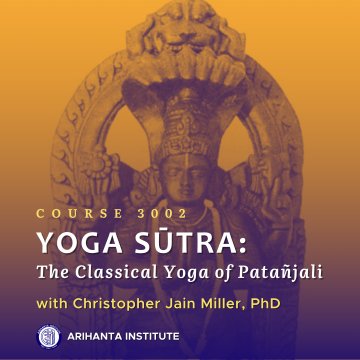
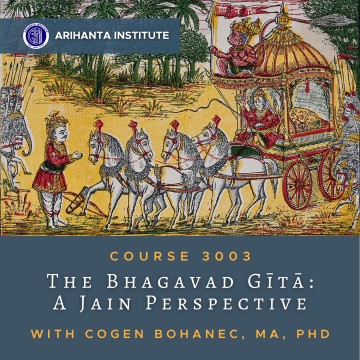
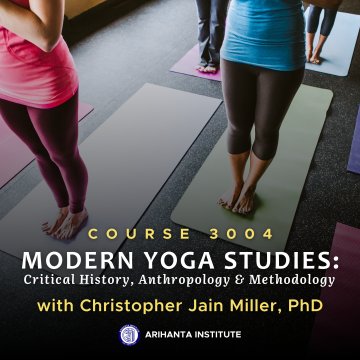
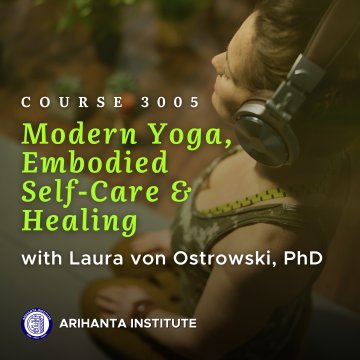
Sanskrit (30hrs, 300 hours including homework)
| Course Number | Course Title | Course Length (hrs) | Instructor | |
|---|---|---|---|---|
| 1 | 2010 | Research Sanskrit: Level 1 | 20 | Cogen Bohanec, MA, PhD |
| 2 | 2011 | Research Sanskrit: Level 2 | 10 | Cogen Bohanec, MA, PhD |
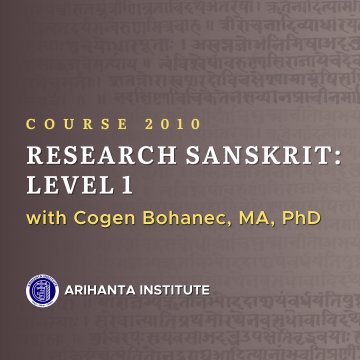
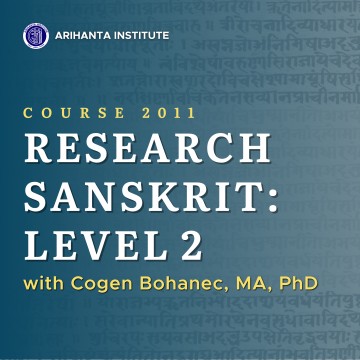
Current University Collaborations


 Christopher Miller, PhD
Christopher Miller, PhD Cogen Bohanec, MA, PhD
Cogen Bohanec, MA, PhD Venu Mehta
Venu Mehta Jonathan Dickstein, PhD
Jonathan Dickstein, PhD